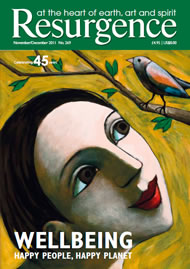As the behind-the-scenes editor of a magazine (this one) that publishes an entire and fairly hefty section of book reviews in every bi-monthly issue, as you can imagine I find rather a lot of books – good, bad and indifferent – passing through my hands, one way or another, each and every week.
It would be fair to say that very few of these, including those that actually make it back to us in the form of an erudite review, have ever actually made me feel or even think about feeling happy.
The topics they are most likely to be tackling are the big and often gloomy ones of the day – poverty, injustice, an unfair distribution of food and wealth, a sick planet, dwindling natural resources, carbon emissions, greed, economic disasters and the like. And whilst we all know we must not shy away from the difficult challenges facing anyone who would like to think they have adopted a more mindful Resurgence-style and values-led way of living, I have to admit sometimes, just sometimes, it does all get the better of me and I have to take, metaphorically, a quiet little lie-down.
However, as a gnarly old Fleet Street editor once boomed at me through his hi-tech electronic voice box (the upshot of too many Marlboro-not-so-Lights) in journalism, we can always expect the unexpected. And so here it is.
Happiness and How It Happens: Finding Contentment Through Mindfulness may not be the catchiest title on the planet, but what did catch my attention, made me smile and made me take more than a passing look at the galley proofs that landed on my desk was the nom de plume of the author, who calls himself The Happy Buddha.
As any good book-commissioning and copy-editor will tell you, what you are looking for in a new title, fiction or non-fiction, is the ‘voice’ – something that connects reader and author in (hopefully) both an authentic and a memorable way – and this dear little almost old-fashioned-looking book has that in spades.
Its author, Suryacitta Malcolm Smith (OK, the Malcolm Smith bit was also a little unexpected, but Suryacitta, I am sure, is his adopted Buddhist name), is a member of the Western Buddhist Order and has practised meditation for more than two decades, leading workshops, courses and retreats across Europe on the art of happiness.
I must admit, I always wonder when I read these wonderful ‘biogs’ – which, like the bionotes we publish in this magazine, basically tell you why this person is qualified to make a pronouncement on this or that matter and why, if they do, we should listen – whether these authors also have to do the shopping, hang out the laundry, walk the dog, hoover the carpets, make a cream tea for the in-laws… But I digress.
Anyway, there it is, a good strong voice, and whilst not a new topic – how-to books on meditation are ten a penny – it has an interesting enough angle, examining the role of meditation in creating and maintaining greater happiness and wellbeing in Western folk.
And as the behind-the-scenes editor, I had, of course, the advantage of knowing we would be publishing a whole slew of articles on happiness in this issue
and that some of those would most likely make mention of meditation as one of the tools we can harness to generate more wellbeing and thus more happiness.
So, very early one Sunday morning whilst the rest of my household slept – quietly and hopefully happily – I opened the bedroom windows so I would hear dawn creeping in over the sea, read this little book from cover to cover, and liked it. A great deal.
The central premise is that happiness is our natural state, which means all we have to do is stop making ourselves ‘unhappy’ and allow that natural state of happiness to just be. And the way we stop making ourselves unhappy is to meditate, and in so doing we learn how to marshal and eventually banish all the nasty little thoughts, including envy, self-pity, expectation, etc., that make us miserable.
By meditating, we let go of these thoughts and then keep that newly empty mental space ‘clear’ for happiness to resurrect itself. (If you meditate you know all this, but this book is aimed at the novice, not the experienced practitioner.)
And if we want to be happier and stay happier, The Happy Buddha suggests we also need to get a grip on the notion that the past is gone, the future hasn’t happened and so all we really have to deal with is the here and now, which we can improve if we would only stop making ourselves unhappy.
“In the present moment,” he writes, “there are no problems and no anxiety. When we live in the present moment we are in touch with our deeper wisdom, and with wisdom we know how to live a good life.”
And it works. Because for a whole week after reading this book, I practised what I had read and was a much, much, much nicer person, and as a result of being so much nicer, I was much, much, much happier with me.
So, as I have said, I like this little book. I like its voice. I like what it is proposing.
I would not, of course, pass it along to anyone living in a refugee camp or a war zone or to the parents and carers on a children’s cancer ward – all of whom have every right to be spectacularly unhappy – but I would pop it in a Christmas stocking for a friend who’s starting to show some interest in ‘other ways’ of looking at their world, and to anyone asking the kinds of question that suggest they are on the verge of their own version of ‘awakening’.







